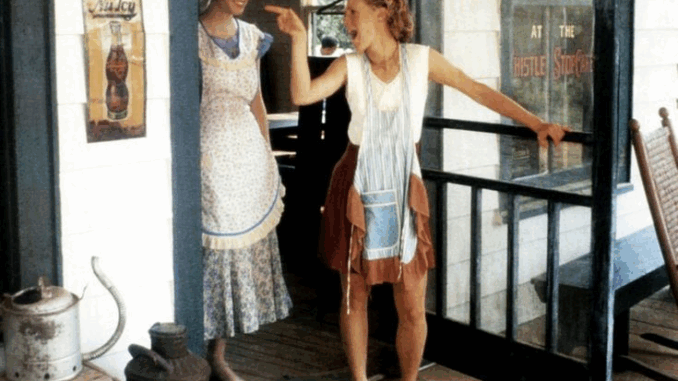
Fried Green Tomatoes is often praised for its heartfelt storytelling, its strong female characters, and its timeless themes of love and loss. But embedded in its narrative is a subtle, powerful thread: the deep emotional bond between generations of women, and how age, rather than being a barrier, becomes a bridge.
This is a story where the old teach the young how to live, and the young help the old feel remembered.
Evelyn and Ninny: A Lifeline Across Time
The most explicit example of this generational connection is the unlikely friendship between Evelyn Couch, a middle-aged housewife drifting into invisibility, and Ninny Threadgoode, a spry 80-something woman with a story for every silence.
What begins as polite listening turns into:
-
A weekly ritual.
-
A source of personal empowerment.
-
A reclamation of identity for Evelyn.
Ninny’s tales about Whistle Stop, Idgie, Ruth, and the café offer more than nostalgia — they offer Evelyn a blueprint for resilience, rebellion, and self-love.
Ninny doesn’t tell Evelyn what to do.
She simply shows her who she could be.

Older Women in Media — A Radical Presence
Hollywood rarely gives space to older women outside of comic relief or background support. Fried Green Tomatoes broke that mold in 1991 by:
-
Making Ninny central to the plot.
-
Showing her as sharp, witty, and emotionally vital.
-
Allowing her to reshape another woman’s life through storytelling.
She isn’t a relic. She’s a mentor. A memory-keeper. A force of nature in a straw hat.
Idgie and Ruth: The Predecessors Who Lived It First
While Evelyn and Ninny’s friendship takes place in the present, Idgie and Ruth’s bond is the emotional backbone of the past. Through their story, we witness:
-
The courage to defy gender roles.
-
The strength to build a chosen family.
-
The cost of love and loss — and how it still feeds the soul.
Though they lived decades before Evelyn, their spirit survives, transmitted through Ninny’s recollection.
It’s not just memory. It’s legacy.
Mirroring the Phases of Womanhood
Each main woman in the film occupies a different phase of life:
| Character | Age Stage | Role/Function |
|---|---|---|
| Idgie Threadgoode | Young adulthood | Defiance, courage, nonconformity |
| Ruth Jamison | Motherhood/midlife | Nurture, strength in quiet |
| Evelyn Couch | Midlife crisis | Awakening, transformation |
| Ninny Threadgoode | Old age | Wisdom, memory, mentorship |
Together, they represent a spectrum of womanhood, proving that every stage has value, purpose, and its own kind of power.
Evelyn’s Growth: A Case Study in Intergenerational Healing
Evelyn begins the film feeling invisible — dismissed by her husband, neglected by society, and frustrated with aging. But by the end, through Ninny’s tales, she:
-
Reclaims her agency (“Towanda!”).
-
Revives her compassion.
-
Begins to imagine a life beyond the domestic shell she had resigned herself to.
Ninny doesn’t just tell her stories — she models what it means to keep growing, even in old age.
The Cycle Continues
The film ends on a note that suggests continuity. Just as Ninny passes the baton of memory and courage to Evelyn, one imagines Evelyn might someday do the same for someone else.
It’s a reminder that:
-
Wisdom is not wasted with age.
-
Every woman carries the potential to inspire another — whether through rebellion, kindness, or a plate of fried green tomatoes.
Final Thought: Age Is Not a Limit — It’s a Lifeline
In Fried Green Tomatoes, the women don’t just survive — they evolve. And they do it by holding each other across time, reaching forward and backward to lift each other up.
The film quietly insists on this truth: our stories don’t end with us. They are passed on, like recipes, like laughter, like love.
